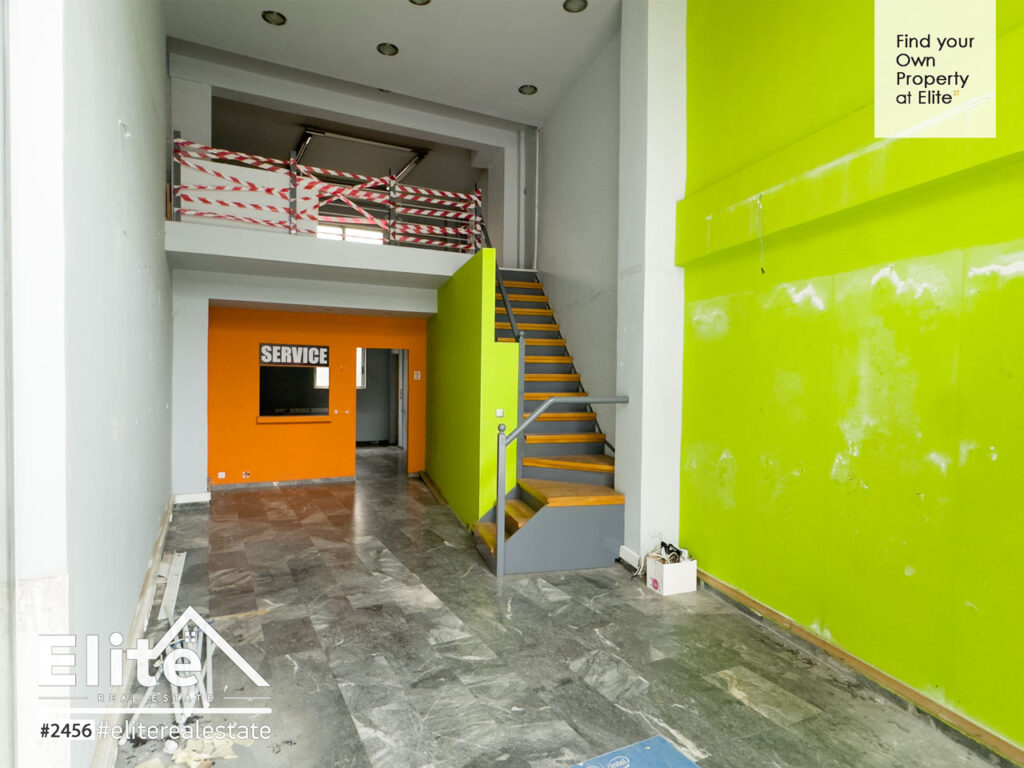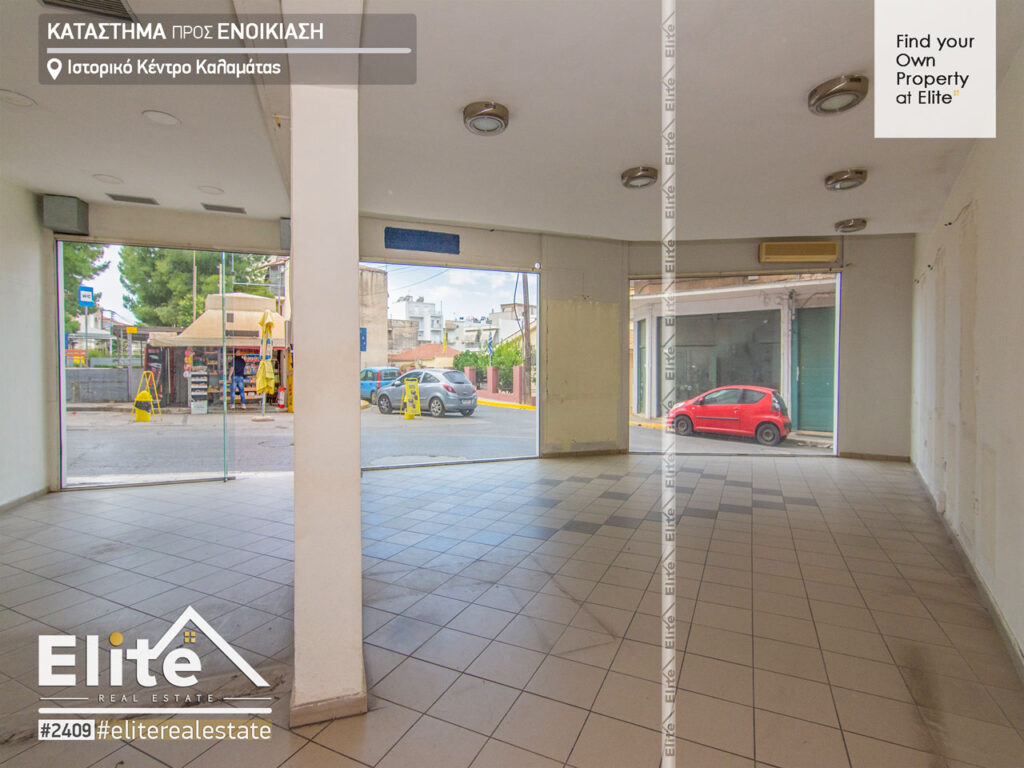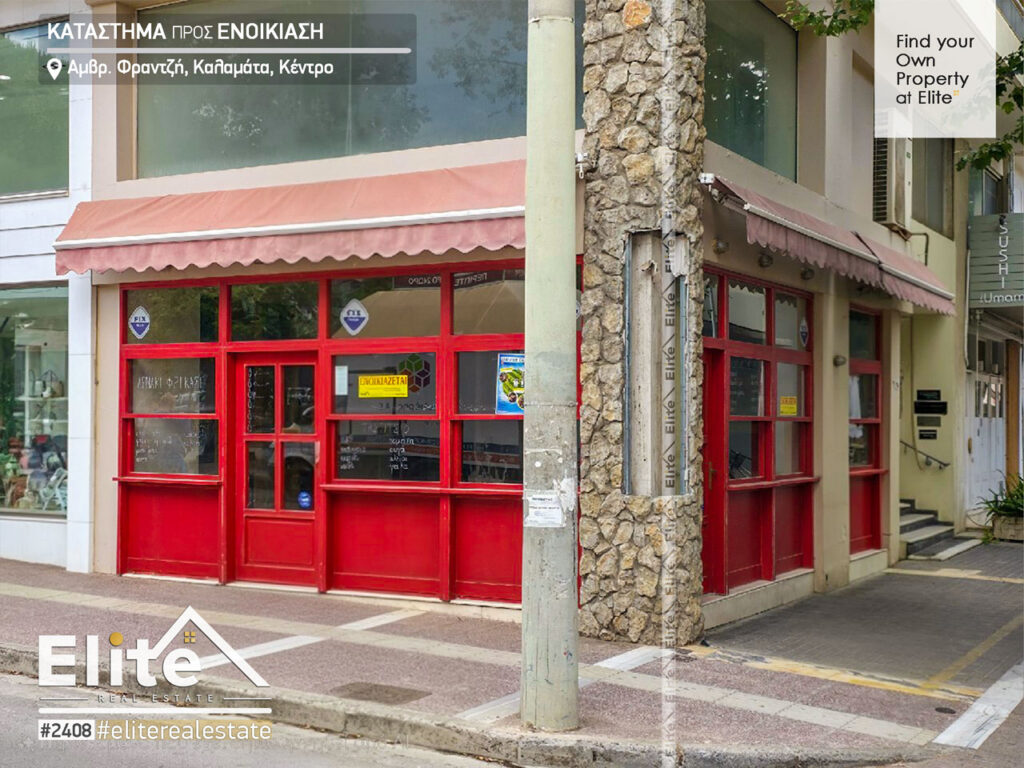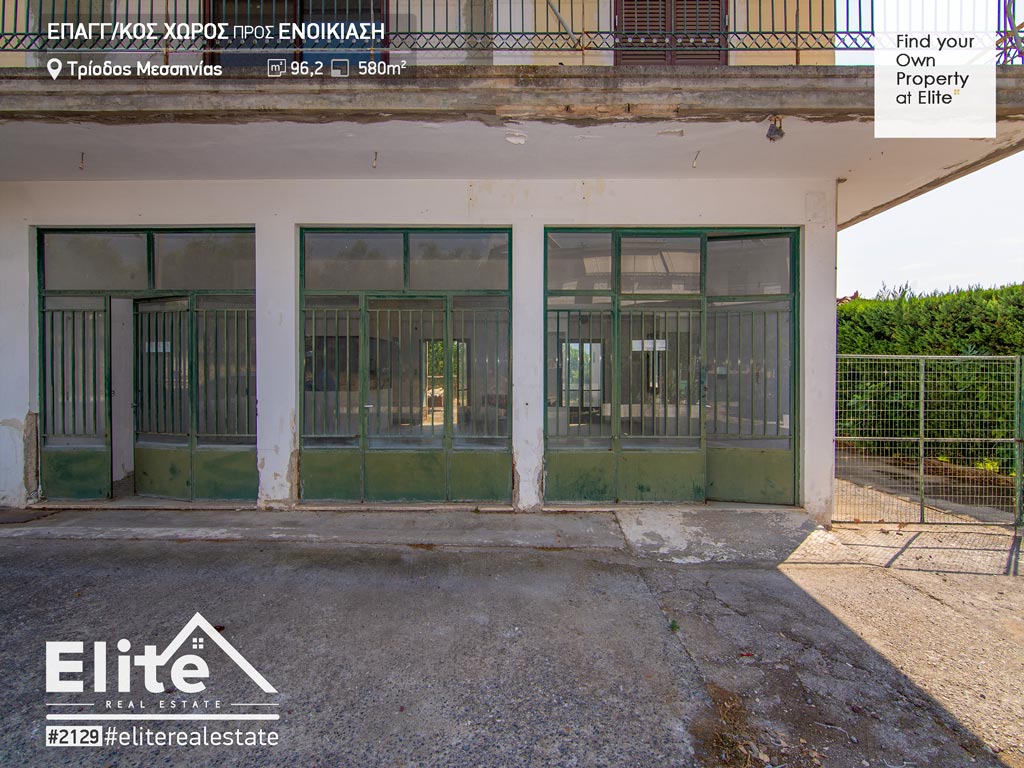Rentals of commercial properties in Kalamata - Elite Real Estate
Kalamata Offices | Kalamata Stores | Business Premises Kalamata | Warehouses Kalamata | Kalamata Hall | Kalamata Hotel
Rentals of commercial properties in Kalamata
See business premises for rent in Kalamata and throughout Messinia . Business premises for office , store , storage, room, hotel, accommodation for rent .

Ground floor - Basement - Attic
Energy class: Ε
Listing code: 2456
- 152 m2
- 1WC
- 3 Levels

Kalamata Centre
Energy class: Ζ
Listing code: 2409
- 105 m2
- 1WC
- 1 space
- Ground Floor

Kalamata
Energy class: Ζ
Listing code: 2408
- 150 m2
- 3 sites
- 2 WC
- 1 loft

Triodos Messinia
Energy Class: Z
Listing code: 2129
- 97 m2
- 1WC
- 3 sites
- 580 m2

Corner land plot area Rachi
Energy Class: Not required
Listing code: 2461
- 125 m2
- Corner plot

Heroes of the Technical University Kalamata
Energy class: Η
Listing code: 2422
- 104 m2
- 1WC
- Ground Floor
- Parking
FAQ
Frequently asked questions about commercial premises - commercial real estate
Today, commercial leases in Greece are governed by the Presidential Decree 34/1995, which is the basic legal framework for professional and commercial leases. This decree has been amended by a number of legislative interventions, including ν. 2749/1999, ν. 4242/2014, ν. 4257/2014, ν. 4264/2014, ν. 4335/2015 and ν. 4373/2016, which shaped a new institutional regime that is still in place today.
One of the most important changes introduced by the legislation concerns the distinction between 'old' and 'new' commercial leases. The old leases are those drawn up before 28 February 2014, and are mainly governed by the original provisions of P.D. 34/1995. On the contrary, the new leases - i.e. those concluded after 28 February 2014 - are subject to the revised framework, which brings about greater flexibility in the terms and duration of contracts.
This reform was aimed at improving the investment climate and the strengthening entrepreneurship, giving landlords and professional tenants the possibility to more freely shape the terms of their cooperation. Among other things, it affected issues such as minimum duration of the lease, η Update, as well as the termination of the contract.
Therefore, when drawing up or renewing a professional lease, it is crucial to refer to the time of its conclusion, as the applicable legal regime and the rights of the parties largely depend on it.
What is Commercial Real Estate (CRE)
The commercial real estate (also known as Commercial Real Estate - CRE) constitute a broad category of real estate intended exclusively for professional use. Unlike residential property, which serves residential needs, commercial property is used for purposes such as conducting business, providing services, producing or storing goods, or supporting commercial operations.
In most cases, commercial properties leased to businesses or professionals, who use them for pursuit of gainful activity. The owner of the property (landlord) receives income through rent, while the tenant benefits from the use of a space suitable for his business needs.
The category of commercial real estate is extremely multidimensional and includes properties of all sizes and functions. It can involve from one small space with a shop front (shop window) on the ground floor of an apartment building, up to large building complexes, such as office centres, warehouses, hotels ή shopping centres (malls).
Investing in commercial real estate is considered a strategic choice, both for individuals and for companies or institutional investors, as it combines rental stability and goodwill prospects. In addition, the legal framework in most countries, as in Greece, provides clear rules on the management of leases, the duration of contracts and the obligations of the parties.
Understanding the concept and potential of commercial real estate is crucial for anyone wishing to enter the real estate industry, whether as an owner, tenant or investor.
The duration of a commercial lease is determined in principle freely by the parties, namely the lessor (landlord) and the lessee (tenant). The two parties can agree for as long as they wish the tenancy to last, based on their needs and objectives.
However, the law provides for specific limits and minimum commitments to protect the continuity of professional activities and ensure stability in commercial transactions. In particular:
If the agreed duration of the lease is longer than three years, then this longer period of time is binding on both parties, and shall apply in full.
Conversely, in the event that the parties agree shorter than three years, or do not specify the duration of the lease at all (i.e. it is contract for an indefinite period), then the current legislation requires mandatory minimum duration of three years. This arrangement shall apply irrespective of the original intention of the parties and shall be binding.
This provision is intended to provide stability in the professional hirer, ensuring that it will have sufficient time to develop its business and recoup the cost of the installation or investment. On the other hand, it ensures the owner that the occupation of the property will have a minimum duration, limiting the risk of interruptions or changes with a high frequency.
Therefore, the minimum duration of three years functions as legal basis where there is no clear agreement or where the agreement violates this minimum, while full freedom is given to conclude contracts of longer duration, with validity and parity for all parties.
The position of the lessor in a professional or commercial lease is accompanied by both rights and specific obligations towards the lessee, in accordance with the provisions of the Civil Code and the specific legislation governing commercial leases.
✅ Landlord's main rights
Receipt of rent: The lessor has the right to receive the agreed rent on the agreed dates.
Rent adjustment: If provided for in the contract, the tenant may request a periodic rent adjustment.
Good use of property: It has the right to require the tenant to use the property in accordance with the contract, without damage or alteration of its form.
Status check: May, with reasonable notice, visit the property to ascertain its condition.
Damage restoration: He is entitled to claim compensation for damage caused by the tenant due to misuse.
📌 Main Obligations of the Lessor
Delivery of the property in a suitable condition: It must deliver the space to the lessee in the condition provided for the agreed use.
Maintenance of common facilities: He is responsible for the maintenance of the common or essential functions of the property, unless otherwise agreed.
Non-interference with use: It must not interfere with the proper and uninterrupted use of the lease by the tenant.
Respect of the contractual duration: The contract cannot be terminated prematurely if it is within the binding duration (e.g. 3 years), unless there is good cause or a clause to that effect.
Issue of receipts/receipts: It must issue receipts or invoices for the payment of the rent, in accordance with tax legislation.
The tenant of a commercial or business property enjoys certain rights, which are accompanied by clear legal obligations. Proper compliance with these obligations ensures the smooth development of the lease and the protection of the interests of both parties.
✅ Tenant's Main Rights
Quiet and unobstructed use of the property: The lessee has the right to use the lease according to the terms of the contract, without interference from the lessor.
Use for professional purposes: The property can be used for the activity described in the lease, without arbitrary restrictions.
Minimum lease term protection: The lessee is protected by law with a minimum binding lease term of three years (unless otherwise agreed in his favour).
Right to renew or renegotiate: Although there is no automatic right of renewal, the lessee can request renegotiation or renew the contract with the agreement of the lessor.
📌 Tenant's Main Obligations
Payment of the agreed rent: He/she must pay the rent on time, according to the terms of the contract.
Use according to the purpose of the lease: He cannot change the use of the property without the written consent of the lessor.
Care of the property: He/she is obliged to use the space with care, avoiding damage beyond normal use.
Information on faults: Must inform the landlord in a reasonable time of any problem or damage to the property.
Damage restoration: If it causes damage through negligence or misuse, it is responsible for its repair.
Return of the property: At the end of the lease, he must hand over the property in its original state, unless otherwise provided.
The the amount of the rent in a professional or commercial lease freely determined by both parties, i.e. the lessor and the lessee. There is no statutory minimum or maximum limit, which allows the amount to be determined on the basis of the commerciality of the property, its location, its amenities and market conditions.
Any agreement on the initial amount of the rent, as well as for the future adjustment of the - whether it is an increase or a decrease - shall be considered absolutely valid and legally binding for both parties, provided that it is included in the contract or proved in a clear and indisputable manner.
It can be agreed, for example, constant annual growth (percentage or absolute), indexation based on a consumer price index or specific adjustment clauses depending on the use or investment in the property.
📄 Tax surcharge - Stamp duty
In the case of professional leases, the imposition of Paper label 3,6% on the agreed rent. This percentage includes:
3% paper stamp,
0,6% OGA contribution.
The stamp duty is calculated monthly or annually (depending on the frequency of payment of the rent) and constitutes income tax, whom the lessor shall be obliged to deliver, unless otherwise agreed.
H rental guarantee is a sum of money usually paid by the lessee to the lessor at the start of the lease, in order to cover any future debts or damages that may arise during the term of the lease.
According to market practice, the guarantee usually corresponds to one to three months of rent, depending on the commerciality of the property, the profile of the tenant and the duration of the contract. In addition, there is the possibility, if agreed between the parties, the security shall be adjusted in line with the change in the rent, so as to keep it proportional to the total economic value of the lease.
It is noted that the the amount of the guarantee, ο method of payment of the and each revaluation provision of are not regulated by a binding legal provision. It is about subject to free agreement between the contracting parties, which is explicitly recorded in the lease contract.
The guarantee shall not be automatically offset with rents or other obligations during the term of the lease, unless expressly agreed. Usually, the reimbursement is made after the end of the lease and the delivery of the property in the condition provided for in the contract, provided that there are no outstanding debts or deterioration justifying retention.





